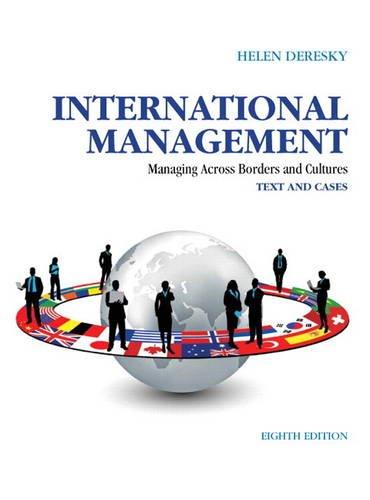There are risks and rewards for all in a global economy. The globalization of human capital results
Question:
There are risks and rewards for all in a global economy. The globalization of human capital results in a range of winners and losers around the world: companies and their stockholders, consumers, contractors, firms up and down the supply chain, employed people, and unemployed people, as well as their economies. In February 2011, President Obama asked Apple’s Steve Jobs why Apple could not bring back all the jobs it used to provide in the United States. The jobs related to most high-tech products made by companies such as Dell, HP, and Apple have now migrated overseas, including those for Apple’s 70 million iPhones, 30 million iPads, and 59 million other products sold in 2011. Breaking down the retail price of $500 for Apple’s iPhone, for example, Time magazine estimates that $61 worth of value comes from Japan, with its high-end technology manufacturing; $30 of value is added from Germany; $23 from South Korea; $7 from Chinese assembly lines; $48 from “unspecified”; and $11 from the U.S. Those inputs total $179 for parts and assembly abroad, leaving Apple, the inventor in the U.S., a profit of $321. For the first quarter of 2012, Apple made $13 billion in profit.
Although Apple directly employs 43,000 in the U.S. and 20,000 overseas, an additional 700,000 people engineer, build, and assemble iPads, iPhones, and Apple’s other products in Asia and Europe. Sophisticated component parts outsourced in various countries are assembled in China. Some of those are contracted to the Taiwanese-headquartered company Foxconn’s Longhua factory campus in Shenzhen, for example, where over 300,000 employees live in dorms, eat on site, and churn out iPhones, Sony PlayStations, and Dell computers. Foxconn Technology, with 1.2 million employees in plants throughout the country, is China’s largest exporter and assembles an estimated 40 percent of the world’s consumer electronics, including for customers such as Amazon, Dell, Hewlett-Packard, Nintendo, Nokia, and Samsung. No other factories in the world have the manufacturing scale of Foxconn.
China is being forced to take notice of such problems and labor is gaining some ground; the issue then is that firms have already started to move jobs to other countries with lower wages.
1. Harding, Robin; Hille, Kathrin; Jung-a, Song; Kwong, Robin, “Apple, HP and Dell Probe Foxconn,” Financial Times, London (UK), May 27 2010; Charles Duhigg and Keith Bradsher, “How U.S. Lost Out on iPhone Work,” www.nytimes.com, January 21, 2012; Jason Dean, “Corporate News: China Worker Suicides Draw Scrutiny,” Wall Street Journal, May 15, 2010: B.5; Frederik Balfour and Tim Culpan, “The Man Who Makes Your iPhone,” Bloomberg Business Week, September 9, 2010; Andrew Morse and Nick Wingfield, “Apple Audits Labor Practices—Company Says Suppliers Hired Underage Workers, Violated Other Core Policies,” Wall Street Journal, March 1, 2010: B.3; Duncan Hewitt, “Labor’s Day in China: Still, there’s a risk for China: As labor’s lot improves, employers may move where wages are lower and workers more pliable,” Newsweek 155. 25, June 21, 2010; Ton Dokoupil, “The Last Company Town: There was a time when employers provided everything: houses, hospitals, bars. Such a place still exists—but not for long. Welcome to Scotia, Calif.,” Newsweek 157. 8, February 21, 2011; Charles Duhigg and David Barboza, “In China, Human Costs Are Built Into an iPad,” www.nytimes.com, January 25, 2012; Fareed Zakaria, “The Case for Making It in the U.S.A.,” Time, February 6, 2012; Nick Wingfield, “Apple Announces Independent Factory Inspections,” www.nytimes.com, February 13, 2012; David Barboza, “Foxconn Plans to Lift Pay Sharply at Factories in China,” New York Times, February 18, 2012.
2. Duhigg and Bradsher, 2012.
3. M. Schuman, “Adding Up the iPhone: How an American Invention Makes Money for the World,” Time, May 16, 2011.
4. Ibid.
5. Duhigg and Bradsher, 2012.
6. Duhigg and Barboza, January 25, 2012.
Questions
1. What is meant by the globalization of human capital? Is this inevitable as firms increase their global operations?
2. How does this case illustrate the threats and opportunities facing global companies in developing their strategies?
3. Comment on the Apple executive’s assertion that the company’s only obligation is making the best product possible. “We don’t have an obligation to solve America’s problems.”
4. Who are the stakeholders in this situation and what, if any, obligations do they have?
5. How much extra are you prepared to pay for an iPhone if assembled in the United States?
6. How much extra are you prepared to pay for an iPhone assembled in China but under better labor conditions or pay? What kind of trade-off would you make?
7. To what extent do you think the negative media coverage has affected Apple’s recent decision to ask the FLA to do an independent assessment and the subsequent decision by Foxconn to raise some salaries? What do you think will happen now?
Step by Step Answer:

International Management Managing Across Borders And Cultures Text And Cases
ISBN: 9780133062120
8th Edition
Authors: Helen Deresky





